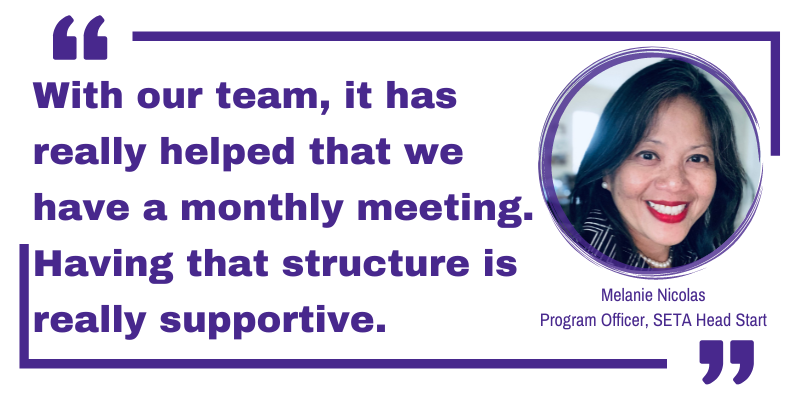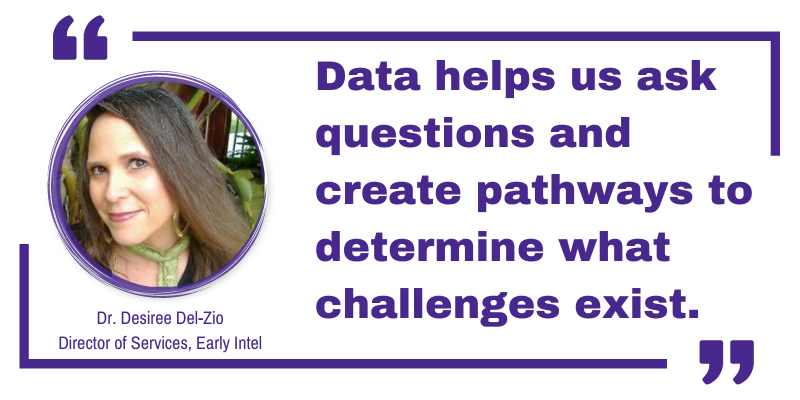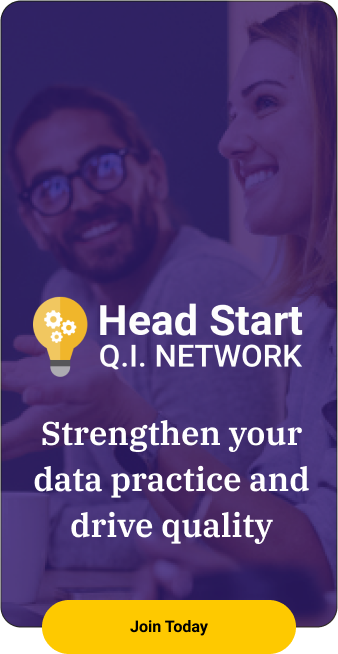As Head Start programs seek to strengthen their data use, they are beginning to use a new kind of resource: coaches.
Data coaches started appearing in K-12 school districts over a decade ago. They help faculty glean insights from the mass of information they collect. With new federal requirements for data, now Head Start programs are engaging coaches as well.
What is it like working with a data coach? Coaches can help incorporate data insights into workflows, engage staff and support better decision making. “They know a lot about what’s going on around the nation when it comes to data analytics and program outcomes,” says Dr. Desiree Del-Zio, Director of Services at Early Intel.
Here’s a look at the many ways that data coaches can help Head Start programs improve systems through data.
Data coaches as accountability partners
For Head Start teams juggling competing responsibilities and priorities, outside accountability can be key. A data coach can help them stay committed to quality improvement projects throughout the year. Without the consistency of regular meetings and check-ins, day-to-day priorities can overshadow longer-term goals.
“[Our coach] checks in with me as the team contact and then I make sure our team gets involved in the process,” says Melanie Nicolas, Program Officer with SETA Head Start and a member of the QI Network. “With our team, it has helped that we have a monthly meeting with her. Having that structure is really supportive.”

Data coaches as explorers
Early childhood managers are used to traditional MIS reports. However, the new expectation is to go beyond these reports to sort and analyze data. This can be intimidating for staff who are unfamiliar with data analysis. The Office of Head Start increasingly expects managers to consider the trends and patterns of their data over time. That’s where a coach can come in. “They are trained to help the program identify correlations between data sets,” Del-Zio says.
For instance, if a program has high outcomes for CLASS monitoring but child outcomes in the same classrooms show low progress, the disconnect demands attention. “A data coach could help the program dig deeper into the data to see which data set might be unreliable and why,” Del-Zio says. “They can also help programs disaggregate these data across content areas and find potential correlations between services and their service delivery model.”
Data coaches as thought partners
As Head Start experts, data coaches bring a wealth of knowledge and experience. This includes best practices for data collection and analysis. “They are going to orient programs each year to help make sense of the work that we’re going to do,” Del-Zio says. “This includes everything from navigating and deciphering their dashboard features, linking real-time data to historical data, developing tools and tests for program assumptions about emerging challenges, to individualizing their experiences based on community needs.”
Data coaches as catalysts
Data coaches can help programs develop questions that their data is posing, according to Del-Zio. “Data helps us ask questions and create pathways to determine what challenges exist,” she says. “The data coach really works very closely with the program to help develop those questions in a meaningful way and follows up on those questions with them as they routinely meet and look back at things they’ve talked about in the past.

By creating ongoing questions about program information, the coach and program staff can reflect on identifications, question activities designed to understand those identifications, and pivot as needed. Del-Zio is working with a program now that is linking excessive absenteeism to low CLASS scores in Emotional Support and children’s school readiness outcomes. “It is fascinating to consider the potential of these seemingly disconnected patterns correlating with and effecting one and other,” she says. “This kind of analysis pushes up deeper into root causes and positions us to create data-informed quality improvement initiatives.”
A data coach might help a program surface discoveries that they can then take to their improvement coach for further inquiry. Del-Zio stresses that data coaches don’t know everything, but they can help point programs in the right direction to find those answers as efficiently as possible.
“[Our coach] says data doesn’t always have answers, but it often leads to questions,” says Melanie Mueller, Executive Director for YMCA of the East Bay and a member of the QI Network. “That is true. There are endless amounts of questions and meaning that you can draw from different data sources.”
As Head Start programs seek to strengthen their data use, they are beginning to use a new kind of resource: coaches. Data coaches started appearing in K-12 school districts over a decade ago. They help faculty glean insights from the mass of information they collect. With new federal requirements for data, now Head Start programs are engaging coaches as well.
What is it like working with a data coach? Coaches can help incorporate data insights into workflows, engage staff and support better decision making. “They know a lot about what’s going on around the nation when it comes to data analytics and program outcomes,” says Dr. Desiree Del-Zio, Director of Services at Early Intel.
Here’s a look at the many ways that data coaches can help Head Start programs improve systems through data.
Data coaches as accountability partners
For Head Start teams juggling competing responsibilities and priorities, outside accountability can be key. A data coach can help them stay committed to quality improvement projects throughout the year. Without the consistency of regular meetings and check-ins, day-to-day priorities can overshadow longer-term goals.
“[Our coach] checks in with me as the team contact and then I make sure our team gets involved in the process,” says Melanie Nicolas, Program Officer with SETA Head Start and a member of the QI Network. “With our team, it has helped that we have a monthly meeting with her. Having that structure is really supportive.”
Data coaches as explorers
Early childhood managers are used to traditional MIS reports. However, the new expectation is to go beyond these reports to sort and analyze data. This can be intimidating for staff who are unfamiliar with data analysis. The Office of Head Start increasingly expects managers to consider the trends and patterns of their data over time. That’s where a coach can come in. “They are trained to help the program identify correlations between data sets,” Del-Zio says.
For instance, if a program has high outcomes for CLASS monitoring but child outcomes in the same classrooms show low progress, the disconnect demands attention. “A data coach could help the program dig deeper into the data to see which data set might be unreliable and why,” Del-Zio says. “They can also help programs disaggregate these data across content areas and find potential correlations between services and their service delivery model.”
Data coaches as thought partners
As Head Start experts, data coaches bring a wealth of knowledge and experience. This includes best practices for data collection and analysis. “They are going to orient programs each year to help make sense of the work that we’re going to do,” Del-Zio says. “This includes everything from navigating and deciphering their dashboard features, linking real-time data to historical data, developing tools and tests for program assumptions about emerging challenges, to individualizing their experiences based on community needs.”
Data coaches as catalysts
Data coaches can help programs develop questions that their data is posing, according to Del-Zio. “Data helps us ask questions and create pathways to determine what challenges exist,” she says. “The data coach really works very closely with the program to help develop those questions in a meaningful way and follows up on those questions with them as they routinely meet and look back at things they’ve talked about in the past.
By creating ongoing questions about program information, the coach and program staff can reflect on identifications, question activities designed to understand those identifications, and pivot as needed. Del-Zio is working with a program now that is linking excessive absenteeism to low CLASS scores in Emotional Support and children’s school readiness outcomes. “It is fascinating to consider the potential of these seemingly disconnected patterns correlating with and effecting one and other,” she says. “This kind of analysis pushes up deeper into root causes and positions us to create data-informed quality improvement initiatives.”
A data coach might help a program surface discoveries that they can then take to their improvement coach for further inquiry. Del-Zio stresses that data coaches don’t know everything, but they can help point programs in the right direction to find those answers as efficiently as possible.
“[Our coach] says data doesn’t always have answers, but it often leads to questions,” says Melanie Mueller, Executive Director for YMCA of the East Bay and a member of the QI Network. “That is true. There are endless amounts of questions and meaning that you can draw from different data sources.”


